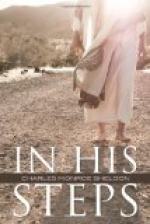Chapter Twenty-nine
The breakfast hour at the settlement was the one hour in the day when the whole family found a little breathing space to fellowship together. It was an hour of relaxation. There was a great deal of good-natured repartee and much real wit and enjoyable fun at this hour. The Bishop told his best stories. Dr. Bruce was at his best in anecdote. This company of disciples was healthily humorous in spite of the atmosphere of sorrow that constantly surrounded them. In fact, the Bishop often said the faculty of humor was as God-given as any other and in his own case it was the only safety valve he had for the tremendous pressure put upon him.
This particular morning he was reading extracts from a morning paper for the benefit of the others. Suddenly he paused and his face instantly grew stern and sad. The rest looked up and a hush fell over the table.
“Shot and killed while taking a lump of coal from a car! His family was freezing and he had had no work for six months. Six children and a wife all packed into a cabin with three rooms, on the West Side. One child wrapped in rags in a closet!”
These were headlines that he read slowly. He then went on and read the detailed account of the shooting and the visit of the reporter to the tenement where the family lived. He finished, and there was silence around the table. The humor of the hour was swept out of existence by this bit of human tragedy. The great city roared about the Settlement. The awful current of human life was flowing in a great stream past the Settlement House, and those who had work were hurrying to it in a vast throng. But thousands were going down in the midst of that current, clutching at last hopes, dying literally in a land of plenty because the boon of physical toil was denied them.
There were various comments on the part of the residents. One of the new-comers, a young man preparing for the ministry, said: “Why don’t the man apply to one of the charity organizations for help? Or to the city? It certainly is not true that even at its worst this city full of Christian people would knowingly allow any one to go without food or fuel.”
“No, I don’t believe it would,” replied Dr. Bruce. “But we don’t know the history of this man’s case. He may have asked for help so often before that, finally, in a moment of desperation he determined to help himself. I have known such cases this winter.”
“That is not the terrible fact in this case,” said the Bishop. “The awful thing about it is the fact that the man had not had any work for six months.”
“Why don’t such people go out into the country?” asked the divinity student.
Some one at the table who had made a special study of the opportunities for work in the country answered the question. According to the investigator the places that were possible for work in the country were exceedingly few for steady employment, and in almost every case they were offered only to men without families. Suppose a man’s wife or children were ill. How would he move or get into the country? How could he pay even the meager sum necessary to move his few goods? There were a thousand reasons probably why this particular man did not go elsewhere.




